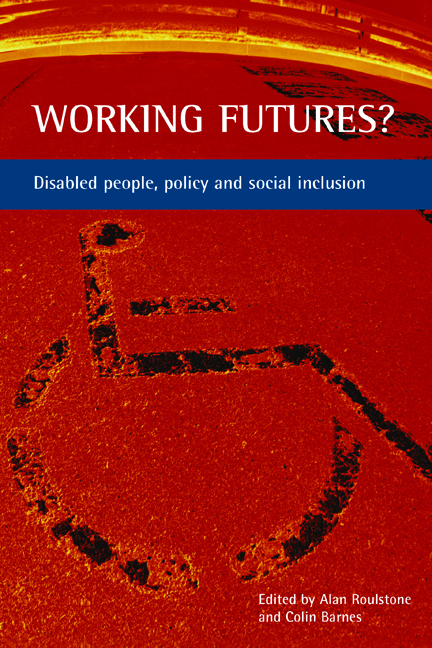Book contents
- Frontmatter
- Contents
- List of figures, tables and boxes
- Preface
- Acknowledgements
- List of abbreviations
- Notes on contributors
- Introduction Working futures: disabled people, employment policy and social inclusion
- Part One Work, welfare and social inclusion: challenges, concepts and questions
- Part Two The current policy environment
- Part Three Towards inclusive policy futures
- Index
- Also available from The Policy Press
Preface
Published online by Cambridge University Press: 18 January 2022
- Frontmatter
- Contents
- List of figures, tables and boxes
- Preface
- Acknowledgements
- List of abbreviations
- Notes on contributors
- Introduction Working futures: disabled people, employment policy and social inclusion
- Part One Work, welfare and social inclusion: challenges, concepts and questions
- Part Two The current policy environment
- Part Three Towards inclusive policy futures
- Index
- Also available from The Policy Press
Summary
This collection of writings emanates from a national invited seminar that took place in Sunderland in the autumn of 2003. The contributors included academics, disability activists, senior civil servants and representatives of voluntary sector opinion formers. The event was an exciting fusion of ideas and was one of the first of its kind to look in depth at the question of disabled people and employment in the 21st century. The seminar brought together disabled people and activists with established and new policy writers and analysts. It was felt important to provide a forum for an exchange of views to take place at a time that disability and employment had become a major focus for government attention. Indeed, we had no difficulty attracting a colleague from the Prime Minister's Strategy Unit to the event.
While diverse views and specialist papers were presented, there was some sharing of concern that disability employment policy, despite the mountain of paper and initiatives it produced, was not making significant inroads in enhancing the employment openings for disabled people. It was also felt that the terrain of discussion should widen beyond simply that of access to paid work and the need to look more creatively at the economic and social contributions made by disabled people outside of paid work, hence the title of the seminar and book, Working futures? Here, ‘work’ can be taken to mean much more than paid employment, while ‘working’ relates to new policy ideas that function to include rather than exclude or coerce disabled people. However, it was felt that paid work remained a key building block of a just society and that disabled people required better, more focused and evidenced policy. Current policy was like the ‘curate's egg’, good in parts. However, questions were asked as to why disabled people were not more fully included in the policy process and the book begins to broach this issue.
The ideas represented in this collection are entirely those of their authors and do not necessarily represent the views of funding agencies or indeed their employers. The introductory and concluding chapters are both a distillation of the wider commentary provided in the book and some more daring thoughts about enabling futures which, although challenging, attempt to move debate forward.
- Type
- Chapter
- Information
- Working Futures?Disabled People, Policy and Social Inclusion, pp. vii - viiiPublisher: Bristol University PressPrint publication year: 2005



